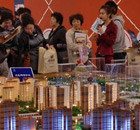Hot on the Web
Online chat focuses on pressing issues
(China Daily)
Updated: 2010-03-01 07:35
 |
Large Medium Small |
|
 Premier Wen Jiabao answers questions during a two-hour online interview in Beijing on Saturday.[Ma Zhancheng/China Daily] |
Wen takes more than 20 questions from netizens in two-hour webcast
BEIJING: Premier Wen Jiabao focused mainly on domestic issues and challenges during his second annual online chat with the public on Saturday, in which he described 2010 as "the most complicated year" for the country.
In the two-hour live webcast, Wen answered more than 20 questions fielded by netizens, touching upon a wide range of issues including the country's grave employment situation, fledgling economic recovery, soaring housing prices, inflation, corruption and a cross-Straits economic pact.
Wen's talk was rewarded by over 400,000 posts on the Xinhuanet website, and more than 100,000 text messages sent by mobile phone users.
Wen did not talk too much about international affairs, such as climate change or relations with neighboring countries, except trade conflicts with the United States. The premier vowed the country would remain open to the outside world when mentioning the upcoming Shanghai World Expo.
In a white shirt and dark jacket, Wen answered questions with "frankness and sincerity", netizens said. Some scrupulous watchers even posted messages saying that "he dressed exactly the same as in last year's online chat", which also fell ahead of the country's annual top legislative session.
In his opening remarks, Wen said: "I don't feel so nervous this time, but I still cherish this opportunity, as such kinds of opportunities remain limited."
"The problems of the public often keep me up night after night, searching for solutions," he said.
Noticing that netizens' questions and the premier's remarks both focused on domestic issues, observers said that it suggests China is still a developing country with numerous thorny issues of its own.
The chat seems to support the belief held by Chinese leaders that the country's most pressing task is to address domestic issues, they said.
Professor Zheng Yongnian, director of the East Asia Institute of the National University of Singapore, said: "It is reasonable that China is paying more attention to domestic issues, as China's handling of domestic issues, if properly handled, is itself a contribution to international society.
"The adroit handling of domestic issues is the foundation for China to hold other responsibilities in international society," he added.

Goals set within term
In response to the frustration of China's would-be homeowners' over the country's soaring housing prices, Wen pledged to tame the "wild-horse" housing market and keep prices at a reasonable level within his term as premier.
The government will increase the supply of housing, and implement land, finance and tax polices to enable more people to buy their own houses.
Another goal set by the premier within his term was to improve the country's medical insurance system as part of China's ongoing medical reform.
"The government will increase State spending on medical insurance by 50 percent in 2010, from 80 yuan ($11.70) to 120 yuan per person," Wen said.
Responding to public concerns over product quality, Wen pledged that companies producing counterfeit or substandard products should be punished with no tolerance or lenience.
"We shall not go soft (on those companies), in order to protect the overall interests of the Chinese nation," Wen said.
Wen said he was confident in China's economic development in 2010, even though it would be "the most complicated year" for the nation's economy.
"Last year was the most difficult year for China's economic development, while this year will be the most complicated," Wen said.
"We will consolidate the economic recovery while addressing new challenges," he said.
"The top priority is balancing stable and comparatively fast economic growth with the adjustment of the economic structure and the transformation of the development pattern, while keeping inflation in check," Wen said.
Employment pressure
China is facing serious challenges in employment, though a labor shortage has recently developed in booming coastal cities, Wen said.
He attributed the labor shortage to a possible economic recovery, lack of skilled workers and workers' growing awareness of their own rights and interests as they weigh choices for better salaries.
Although the labor shortage in certain areas signals a stabilized and recovering economy, the serious employment situation in general has not changed, Wen said.
"Every year 150 million migrant workers leave their rural homes to seek jobs in cities, 24 million urban unemployed are waiting for jobs and the number of university graduates will hit a record 6.3 million this year, all adding to the employment pressure," Wen said. "I hope the employment situation is better than last year," he said.
Wen encouraged university graduates to start their own businesses.







